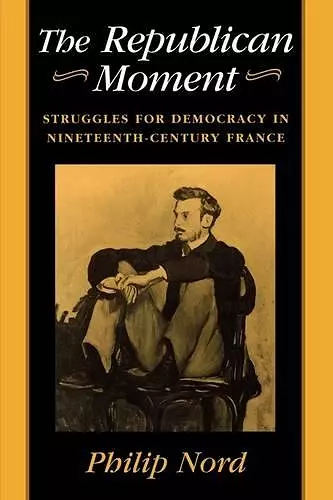The Republican Moment
Struggles for Democracy in Nineteenth-Century France
Format:Paperback
Publisher:Harvard University Press
Published:28th Feb '98
Currently unavailable, and unfortunately no date known when it will be back

France in the mid-nineteenth century was shaken by a surge of civic activism, the "resurrection of civil society." But unlike similar developments throughout Europe, this civic mobilization culminated in the establishment of democratic institutions. How, Philip Nord asks, did France effect a successful transition from Louis-Napoleon's authoritarian Second Empire to a functioning republic based on universal suffrage and governed by middle-class parliamentarians? How did French civic activism take this democratic turn?
Nord provides the answers in a multidimensional narrative that encompasses not only history and politics but also religion, philosophy, art, literature, and gender. He traces the advance of democratic sentiment and the consolidation of political dissent at its strategic institutional sites: the lodges of Freemasonry, the University, the Paris Chamber of Commerce, the Protestant and Jewish consistories, the Paris bar, and the arts. It was the particular character and unfolding of these struggles, Nord demonstrates, that made an awakening middle class receptive to democratic politics. The new republican elite was armed with a specific vision that rallied rural France--a vision of solidarity and civic-mindedness, of moral improvement, and of a socioeconomic order anchored in family enterprise.
Nord's trenchant analysis explains how and why the Third Republic (1870-1940) endured longer than any other regime since the 1789 revolution. The convergence of republican currents at midcentury bequeathed to the French nation a mature civil society, a political elite highly trained in the arts of democratic politics, and an agenda that encompassed not only constitutional reform but also a reformation of private life and public culture.
This first-rate book should be read by all students of the Third French Republic as well as all serious students of modern democratic politics. Nord has upheld his reputation in this excellent book as one of this country's most outstanding social historians of the politics of the Third Republic. -- Eric Arnold, Jr. * History *
[A] groundbreaking and impressively researched work on the transition to democracy in France's Third Republic. Nord...carefully explains how and why democratic institutions took root in France by the mid-1880s and how a democratic citizenry arose. * Library Journal *
This well-written book offers a convincing and original approach to understanding the birth of democracy in nineteenth-century France; it also makes a vital contribution to democratic transition theory in the modern, global context. -- Elinor A. Accampo * Journal of Interdisciplinary History *
This book is a valuable history of associative movements in France and their role in politics, a largely uncharted area of historiography. As a pioneer study, it concurs with the re-evaluation and possibly the rehabilitation of the Empire--a new tendency in French historiography. -- Danielle Tartakowsky * International Review of Social History [UK] *
Rather than viewing the Third French Republic as a failure from a 1940 perspective, Nord explores elegantly and convincingly the dynamic roles of institutions and associations that claimed a public sphere in the transition to a democratic Republic from the authoritarian Second Empire...An excellent study, meticulously researched, with supportive illustrations and rich bibliographic footnotes. Highly recommended. * Choice *
ISBN: 9780674762725
Dimensions: unknown
Weight: 481g
352 pages